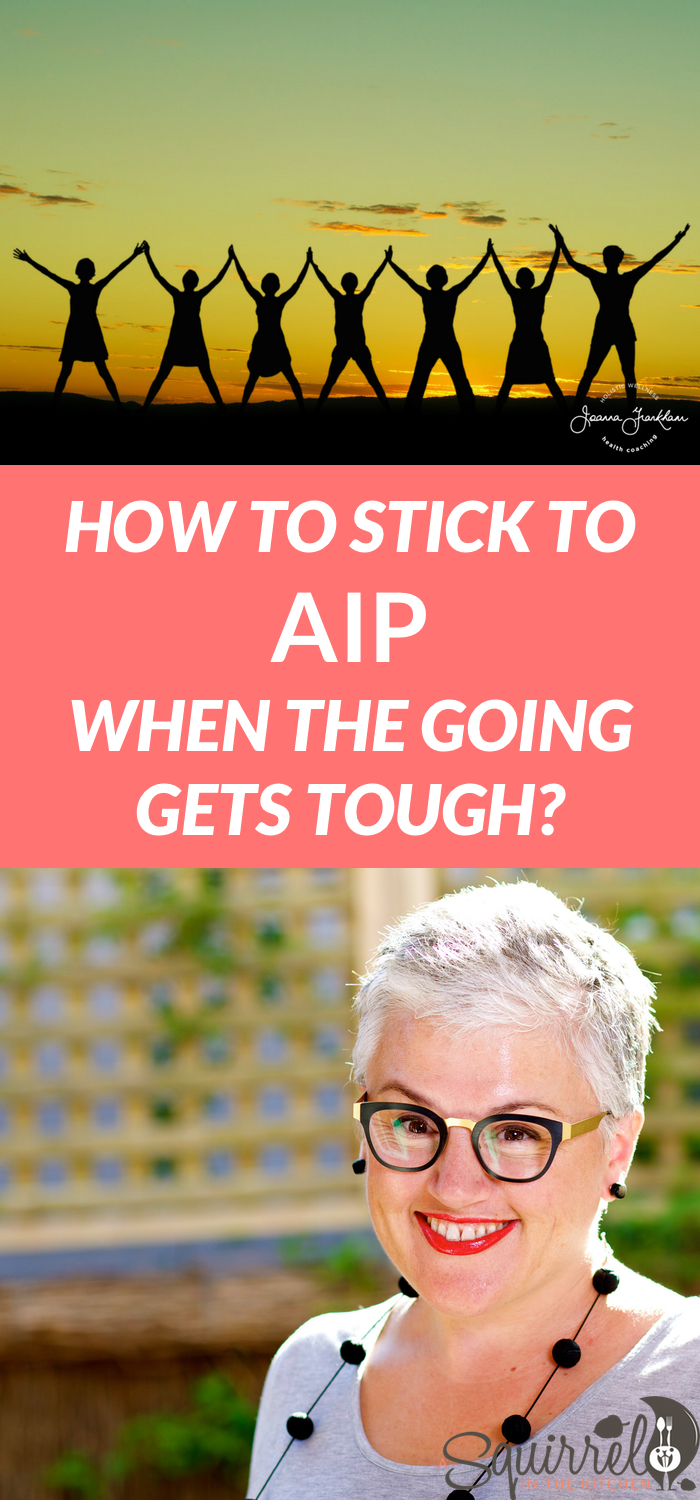
How to stick to the Autoimmune Protocol when the going gets tough? That’s a great question!
I think most of us start out on the Autoimmune Protocol (AIP) template thinking we’ll give it a red-hot go for a while and then – when we feel better – we’ll be able to go back to our old way of living…
The reality is that our old way of living is exactly what got us into this mess in the first place. This is why we have to personalize our own AIP way of life for the long haul – tweak the template to fit our needs over time.
Unfortunately, just because we learn to accept this is our new reality doesn’t mean our AIP way of life becomes a walk in the park!
No matter how seasoned you are at your personal healing protocol, there are times when life gets in the way and your AIP wheels can get a little wobbly, whether it’s the diet, lifestyle aspects, or both.
I’ve been living my AIP lifestyle for almost 5 years, now.
Here are my 5 top tips for (re)finding your AIP groove:
1) Take it back to basics
At its heart, the protocol is an elimination diet to heal the gut. Focusing on nutrient density (bone broth, leafy greens, 8-12 cups vegetables per day, liver, shellfish) to crowd out food choices that aren’t serving you is a good way to get back on track.
If you’re out of the habit of keeping a food and mood diary, now’s the time to start that again – it’s the best way to keep yourself honest!
2) Create rituals that work for you
For any sort of protocol to work long term, we need to create habits that fit with our lifestyle. This means finding tools and tricks to both simplify and personalize your protocol.
Three things that really made a difference for me:
-
- Develop a morning ritual, a set of actions unique to you (that don’t involve checking in with social media!) to help set you off on the right foot for the day. My morning ritual includes a walk with my dog facing the rising sun, a few basic yoga poses and setting an intention for my day.
-
- If sleep is a challenge, why not work on your own personal ‘Operation Sleepy Time’? Our body heals when we are asleep. Creating an evening ritual to give your body every opportunity to experience quality, restful sleep will encourage healing and help with managing life’s curve balls.
- Create a recipe folder for your ‘regular favorites’. These are the tried and true meals you and your family love, and that you know work every time. Having the folder on hand releases some of the stress of what to cook on nights where you’ve lost your cooking mojo. (Sophie’s No Nightshade Ratatouille features in my folder!)
3) Accept that you are human
“Compassion means full immersion in the condition of being human.” – Henri Nouwen
In my coaching practice, I provide coaching support to people suffering from chronic illness using the AIP template as a foundation for diet and lifestyle change. In my experience, one of the most consistently challenging aspects for many of my clients is learning self-compassion. We have a tendency to be hard on ourselves, to hold ourselves to a higher standard than we do others.
The thing is – you are human. You will slip up. We all do, and that is ok. Any sort of healing protocol can be challenging to navigate. The important thing is that you are gentle with yourself when this happens, and – at the same time – that you work on developing the self-awareness to understand just why or how the slip happened; whether this is a behavior you believe needs improvement; and what you’re going to do about it.
Hint: if you’re serious about developing your self-compassion muscle, try building a regular ‘loving kindness’ meditation into your mindfulness routine.
4) It’s not just about diet
When we start out on AIP, it’s easy to think that it’s all about the diet. The thing is, our diet can be the most nutrient dense approach ever but if we fail to address poor lifestyle habits, chances are our health will not improve. Lifestyle habits matter.
Factoring in things like sleep, stress management, connection, getting outside, moving… all these things have a part to play in healing.
5) Get some support
Social isolation is on the rise. But, did you know there is an increased correlation between social isolation and those who suffer from chronic disease?
You might be the most dyed in the wool introvert and you still need human connection and support to thrive.
This AIP way of life can be challenging to navigate on your own. It helps to find others who understand. It’s one of the key reasons I developed the 30-day AIP Reset (enter code SOPHIE for 15% OFF). There are wonderful resources for those starting out on AIP, but not so much available to experienced AIPers seeking to stay on track or recalibrate…
Back in August 2016, I needed to recalibrate my AIP efforts. My AIP wheels were wobbly! I mentioned my intention to have a Reset to some of my readers and a number of them indicated they would like to join me. Before long we had 127 experienced AIPers undertaking a Reset together. The support and camaraderie were wonderful. AIP Reset was born.
 Since then, the program has developed but it remains a 30-day program focused on supporting people who are already well versed in The Autoimmune Protocol (AIP) lifestyle to get back into their ‘AIP groove’ and we cover all the topics I’ve mentioned above, too.
Since then, the program has developed but it remains a 30-day program focused on supporting people who are already well versed in The Autoimmune Protocol (AIP) lifestyle to get back into their ‘AIP groove’ and we cover all the topics I’ve mentioned above, too.
_____________________________________________________________________
About Joanna Frankham
Joanna (Jo) Frankham has been living an AIP way of life for almost five years. Jo’s passion is to help people to improve their health by making lasting behavioural changes to their diet and lifestyle choices.
Jo is a certified health coach, eCourse creator and meditation facilitator. She has a degree in psychology.
You can find Jo at joannafrankham.com, and on Facebook and Instagram.







Great article! What I do is remember why I started. I don’t want to ever go back to being that sick again!
and remember it is a temporary diet, temporary. I tried everything else for 12 years and just got sicker and sicker.
AIP is the only thing that has worked for me so far.
I just think yep, I can go back to eating like I used to, I totally can if I really want but that would mean eventually I would just get as sick as I used to be – no thanks!
Great article, I learned a few things. I’m newly diagnosed and I feel sad I have to pay to get support. That’s the problem today, there’s a charge for helping another soul.
Dear Diane,
How wonderful would it be indeed if health care was accessible to all for free!